お客さま各位
平素はWeblio英会話をご利用いただき誠にありがとうございます。
6月15日(金)は、フィリピンの祝日となっております。
お客様へのレッスン提供へ支障が出ないように尽くしますが、
講師数が足りずにレッスン提供数が減少する可能性がございます。
急なお知らせとなり恐縮ではございますが、
何卒ご理解いただけますようお願い申し上げます。
今後ともWeblio英会話をお引き立てくださいますようお願い申し上げます。
Weblio英会話サポート
お客さま各位
平素はWeblio英会話をご利用いただき誠にありがとうございます。
6月15日(金)は、フィリピンの祝日となっております。
お客様へのレッスン提供へ支障が出ないように尽くしますが、
講師数が足りずにレッスン提供数が減少する可能性がございます。
急なお知らせとなり恐縮ではございますが、
何卒ご理解いただけますようお願い申し上げます。
今後ともWeblio英会話をお引き立てくださいますようお願い申し上げます。
Weblio英会話サポート
| 1. | What is your name? |
| 2. | Do you like history? |
| 3. | Do you study the history of other countries? |
| 4. | What are some of the historical cities in Japan? |
| 5. | Who is the most famous historical person you know? |
| 1. | |
| 2. | |
| 3. | |
| 4. | |
| 5. |
| 1. | What is your name? |
| 2. | Do you like history? |
| 3. | Did you study the history of other countries? |
| 4. | What are some of the historical cities in the Philippines? |
| 5. | Who is the most famous historical person you know? |
| My tutor’s name is | |
| Nicky: | I heard that there are a lot of historical places in Japan. Could you name one? |
| Kevin: | We have the Osaka Castle which was established in the 16th century. It was originally built to represent the authority of Hideyoshi. |
| Nicky: | And, it was reconstructed by the Tokugawa Shogunate which ruled Japan from 1603-1867, right? |
| Kevin: | Yes, That’s right. How about in the Philippines? |
| Nicky: | We have Vigan City in Ilocos. Vigan is one of the most popular tourist spots in the Philippines. Its unique architecture is a combination of cultural elements from the Philippines, China and Spain. |
| Kevin: | Really? I’d love to see that. I have a huge interest in old structures. |
| Nicky: | I’m sure you’d love it. I can take you there when you have time. |
| Kevin: | That’s great! I’ll make myself available for that trip. |
| 1. | When was the Osaka Castle established? |
| Answer: | |
| 2. | Who ruled Japan from 1603-1867? |
| Answer: | |
| 3. | Where is Vigan City located? |
| Answer: |
| 1. | Tutor: | I will go to Japan in 2020 to watch the Olympics. | ||||||||||||||||||||||||||||||||||||||||||||||||||||||||||||||||||||||||||||||||||||||||||||||||||||||||||||||||||||||||||||||||||||||||||||||||||||||||||||||||||||||||||||||||||||||||||||||||||||||||||||||||||||||||||||||||||||||||||||||||||||||||||||||||||||||||||||||||||||||||||||||||||||||||||||||||||||||||||||||||||||||||||||||||||||||||||||||||||||||||||||||||||||||||||||||||||||||||||||||||||||||||||||||
| Student: | That’s nice! Japan also ____ the 1964 Summer Olympics, the 1972 and 1998 Winter Olympics. |
| a. | hosts | ||
| b. | hosted | ||
| c. | was hosted | ||
| d. | hosting |
| 2. | Tutor: | Tokyo is the capital city of Japan. | ||||||||||||||||||||||||||||||||||||||||||||||||||||||||||||||||||||||||||||||||||||||||||||||||||||||||||||||||||||||||||||||||||||||||||||||||||||||||||||||||||||||||||||||||||||||||||||||||||||||||||||||||||||||||||||||||||||||||||||||||||||||||||||||||||||||||||||||||||||||||||||||||||||||||||||||||||||||||||||||||||||||||||||||||||||||||||||||||||||||||||||||||||||||||||||||||||||||||||||||||||||||||||||||
| Student: | Yes, it is. It is also known ___ the largest city in the country. |
| a. | is | ||
| b. | are | ||
| c. | as | ||
| d. | to the |
| 3. | Tutor: | Do you know whom the Philippines was named after? | ||||||||||||||||||||||||||||||||||||||||||||||||||||||||||||||||||||||||||||||||||||||||||||||||||||||||||||||||||||||||||||||||||||||||||||||||||||||||||||||||||||||||||||||||||||||||||||||||||||||||||||||||||||||||||||||||||||||||||||||||||||||||||||||||||||||||||||||||||||||||||||||||||||||||||||||||||||||||||||||||||||||||||||||||||||||||||||||||||||||||||||||||||||||||||||||||||||||||||||||||||||||||||||||
| Student: | It ____ named after King Philip II. |
| a. | had | ||
| b. | was | ||
| c. | were | ||
| d. | has |
| 4. | Tutor: | I heard that Kanji is adapted from Chinese characters. | ||||||||||||||||||||||||||||||||||||||||||||||||||||||||||||||||||||||||||||||||||||||||||||||||||||||||||||||||||||||||||||||||||||||||||||||||||||||||||||||||||||||||||||||||||||||||||||||||||||||||||||||||||||||||||||||||||||||||||||||||||||||||||||||||||||||||||||||||||||||||||||||||||||||||||||||||||||||||||||||||||||||||||||||||||||||||||||||||||||||||||||||||||||||||||||||||||||||||||||||||||||||||||||||
| Student: | Yes, it is. Kanji is kind of difficult ____ I still want to learn it. |
| a. | and | ||
| b. | but | ||
| c. | or | ||
| d. | said |
| 5. | Tutor: | I noticed that some of the words spoken in the Philippines sound Spanish. | ||||||||||||||||||||||||||||||||||||||||||||||||||||||||||||||||||||||||||||||||||||||||||||||||||||||||||||||||||||||||||||||||||||||||||||||||||||||||||||||||||||||||||||||||||||||||||||||||||||||||||||||||||||||||||||||||||||||||||||||||||||||||||||||||||||||||||||||||||||||||||||||||||||||||||||||||||||||||||||||||||||||||||||||||||||||||||||||||||||||||||||||||||||||||||||||||||||||||||||||||||||||||||||||
| Student: | They are actually Spanish. It’s because the Philippines ____ influenced by Spanish culture. |
| a. | has | ||
| b. | was | ||
| c. | were | ||
| d. | have |
| 1. | Do you think studying History is important? |
| Answer: | |
| 2. | What do you think is the best way to learn about history? |
| Answer: | |
| 3. | Do you think traditions teach people about history? |
| Answer: | |
| 4. | Do you think your past decisions changed your life? |
| Answer: | |
| 5. | Do you think it is important to visit historical places? |
| Answer: | |
| 6. | What Japanese period interests you the most? Why? |
| Answer: | |
| 7. | What do you think is the most important thing that happened in the last 10 years? |
| Answer: |
| 1. | b |
| 2. | c |
| 3. | b |
| 4. | b |
| 5. | b |
| 1. | What is your name? |
| 2. | Have you been to Japan? |
| 3. | Do you like Japanese food? |
| 4. | What Japanese custom do you know? |
| 5. | What can you say about the Japanese culture? |
| My tutor’s name is | |
| Alex: | I went to Japan with my family for vacation. |
| Bill: | That’s nice. How was it? |
| Alex: | It was great. We went to Kyoto and Osaka. In Kyoto, we visited famous temples and ate shojin ryori. |
| Bill: | What is shojin ryori? |
| Alex: | It’s a vegetarian meal that follows the Buddhist tradition. |
| Bill: | Interesting. How about Osaka? |
| Alex: | Osaka is a modern city. Its takoyaki is so delicious. |
| Bill: | Wow, takoyaki is one of my favorites! I want to try the takoyaki from Osaka. |
| 1. | What did Bill and his family do in Kyoto? |
| Answer: | |
| 2. | How did Bill describe Osaka? |
| Answer: | |
| 3. | What does Alex want to try in Japan? |
| Answer: |
(Note to tutor: Please find the answer key in the last page.)
| 1. | Tutor: | This is my first time here in Japan. What should I wear during the fireworks festival? | |
| Student: | Most people wear Yukata during festivals. | ||
| Tutor: | I see. Do you know where I can buy Yukata? | ||
| Student: |
| a. | Yes. I don’t know. | ||
| b. | Yes. I can take you there later. | ||
| c. | I don’t like it. | ||
| d. | Of course! It is twice a week. |
| 2. | Tutor: | Have you ever visited a shrine here in Japan? |
| Student: | No, I haven’t. I heard that people buy lucky charms when they visit shrines. | |
| Tutor: | Oh, you mean omamori? It’s a Japanese amulet. Would you like to buy one when we visit a shrine this weekend? | |
| Student: |
| a. | Yes, I’d love to. | ||
| b. | No. I like that. | ||
| c. | I think she is good. | ||
| d. | Maybe, they will. |
| 3. | Tutor: | Do you know how Japanese people greet others? |
| Student: | Yes, Japanese people greet others by bowing. | |
| Tutor: | Is there a proper way of doing that? Can you teach me? | |
| Student: |
| a. | I want to go to the park. | ||
| b. | I have to go. | ||
| c. | Of course. That’s easy. | ||
| d. | Sure. I don’t want to. |
| 4. | Tutor: | I heard that bento is a common meal in Japan. |
| Student: | Yes, it is. I often buy bento on my way to work. | |
| Tutor: | That’s nice. Do you know how to make one? | |
| Student: |
| a. | Yes. I don’t know how to cook. | ||
| b. | No. That’s easy. | ||
| c. | Yes. My mother taught me. | ||
| d. | Yes. Cooking is not my thing. |
| 5. | Tutor: | Do you know why Japanese people slurp their noodles when eating ramen? |
| Student: | Of course, I do! In Japan, slurping is a good manner and it means that you are enjoying your food. | |
| Tutor: | Really? I want to try that. Would you like to eat ramen with me later? | |
| Student: |
| a. | I want to eat pizza later. | ||
| b. | I would love to try it with you. | ||
| c. | My mother is working abroad. | ||
| d. | I went to America last year. |
| Situation: | Your tutor will pretend as a foreign student in your class. You will ask your tutor questions about Japanese culture. |
|||||||||||||||||||||||||||||||||||||||||||||||||||||||||||||||||||||||||||||||||||||||||||||||||||||||||||||||||||||||||||||||||||||||||||||||||||||||||||||||||||||||||||||||||||||||||||||||||||||||||||||||||||||||||||||||||||||||||||||||||||||||||||||||||||||||||||||||||||||||||||||||||||||||||||||||||||||||||||||||||||||||||||||||||||||||||||||||||||||||||||||||||||||||||||||||||||||||||||||||||||||||||||||||
| Items to mention: |
| – Japanese food | ||
| – cultural festival | ||
| – wearing Yukata | ||
| – visit shrines and temples | ||
| – eating with chopsticks | ||
| – watching anime | ||
| – seiza |
| 1. | b |
| 2. | a |
| 3. | c |
| 4. | c |
| 5. | b |
|
Learning a foreign language means more than just acquiring a second language for communication purposes. Language and culture reflect one another. By studying a certain language, the learner also gets to grasp the culture where the language is spoken. Another advantage of learning a foreign language is understanding other people’s feelings. Understanding other people’s feelings is about identifying the speaker’s emotions to interpret the intended message accurately. It comes with understanding not only one’s message but also the intention behind it.
|
|
Today, English is the most common second language spoken in the world. Learning a foreign language can give two major benefits–first is learning about cultures, second is understanding people’s feelings.
|
|
Let me talk about the benefit of learning about cultures. When studying a foreign language, we also learn something about the culture behind it. Let’s have idioms as an example. Idioms are expressions that have another meaning aside from their original definition. Their origin is often based on the local customs where the language is spoken. For example, the idiom “know the ropes” means to know how to do a particular task. It began in the 19th century during the golden age of sailing where knowing how to handle the ropes is essential to operate a ship. This idiom is still in use even until now.
|
|
As for understanding other people’s feelings, it is said that people who can speak two or more languages have stronger intellectual abilities. Imagine that a foreigner in your country is asking for directions. As someone who understands other people’s feelings, you don’t only try to understand him through words. You also try to identify his emotions, so you understand him on a deeper level.
|
|
Studying a foreign language can widen a person’s perspective on various cultures. It also develops understanding of other people’s feelings which is essential when communicating in a foreign language.
|
|
A professor is talking about the benefits of learning a foreign language, the topic mentioned in the passage.
|
|
According to the passage, learning a foreign language means more than just acquiring a second language for communication purposes.
|
|
The professor gives 2 examples of benefits of learning a foreign language. The first point in the passage is that language and culture reflect one another. The professor explains that the learner also gets to grasp the culture where the language is spoken because idioms are often based on local customs.
|
|
The second idea in the passage is that learning a foreign language helps students develop understanding of other people’s feelings.
|
|
The professor states that people who can speak two or more languages have stronger intellectual abilities. He says that people who understand other people’s feelings don’t only try to understand others through words. They also try to identify others’ emotions, so they could understand them on a deeper level.
|
|
Please be informed that the Medical department is requiring all students to wear the official school uniform when attending laboratory classes for security purposes.
|
|
Students can buy the uniform in the bookstore which costs $60. Students who are not wearing the required uniform will not be allowed to attend any laboratory classes. The new regulation will be implemented starting September.
|
|
To avoid any inconvenience, the Medical department advises all students to buy the new uniform as soon as possible.
|
| What are all students required to do? |
| According to the announcement, |
| What are all students required to do? |
| According to the announcement, all students are required to buy the new official uniform and wear it during their laboratory classes. |
|
Female:
|
Good morning. |
|
Male:
|
Hi, have you seen the announcement? |
|
Female:
|
Yes, I saw it a while ago. We need to buy the new uniform before September. |
|
Male:
|
I don’t like the new regulation. |
|
Female:
|
Why? |
|
Male:
|
First, a $60 uniform will be too expensive for students. We don’t have enough time to get a part-time job just to earn enough money to buy it. We have classes until 7:00 p.m. every day. I understand that they are doing this for our safety, but I think there are other ways to do that. |
|
Female:
|
That’s true. |
|
Male:
|
Also, the regulation is too strict. They said that we will not be allowed to attend any laboratory classes if we don’t wear the uniform. Laboratory classes are required in our course. We will fail if we could not attend it because of this new regulation. |
|
Female:
|
I think the uniform is not necessary because we wear proper clothes anyway. |
|
Male:
|
Well, I’ll find a way to buy one. I don’t want to fail my laboratory classes. |
| What are the female student and the male student doing? |
| The female student and the male student are |
| What are the female student and the male student doing? |
| The female student and the male student are talking about an announcement made by the Medical department. |
| Who is against the regulation? |
| Who is against the regulation? |
| The male student disagrees with the new regulation and gives two reasons why he is against the regulation. |
| Why does the male student disagree with the new regulation? |
| First, |
| Why does the male student disagree with the new regulation? |
| First, the male student thinks that a 60-dollar uniform is too expensive for the students. He said students are too busy to get a part-time job. He also thinks that the department can find other ways to secure students’ safety. |
| Second, |
| Why does the male student think that the new policy is too strict? |
| Second, he worries that the students might fail their laboratory classes because of this new regulation. He defended that uniform is not necessary because the students wear proper clothes anyway. |
| All in all, what does the male student say? |
| In short, |
| All in all, what does the male student say? |
| In short, the male student gives a couple of reasons why he doesn’t support the Medical department’s new regulation. |
1. Who built the Kiyomizu temple?
Answer: ______________________________________________________________
2. Who found the waterfall first?
Answer: ______________________________________________________________
3. Why is the temple named “Kiyomizu”?
Answer: ______________________________________________________________
4. What is the Kiyomizu temple famous for?
Answer: ______________________________________________________________
5. Have you visited the Kiyomizu temple?
Answer: ______________________________________________________________
6. How do you describe the Kiyomizu temple?
Answer: ______________________________________________________________
7. What is best season to visit there?
Answer: ______________________________________________________________
8. Why do a lot of tourists visit Kiyomizu temple?
Answer: ______________________________________________________________
|
I’m sorry.
|
ごめんなさい。
|
|
Are you okay?
|
大丈夫ですか?
|
|
I’m okay.
|
大丈夫です。
|
|
No problem.
|
問題ないです。
|
|
Bye.
|
バイバイ。
|
|
See you tomorrow.
|
また明日。
|
|
TUTOR:
|
Good morning, Sarah. |
|
STUDENT:
|
Good morning, Jack. |
|
TUTOR:
|
No, I’m not Jack. I’m John. |
|
STUDENT:
|
Oh, you are not Jack. I’m sorry, John. |
|
TUTOR:
|
No problem. |
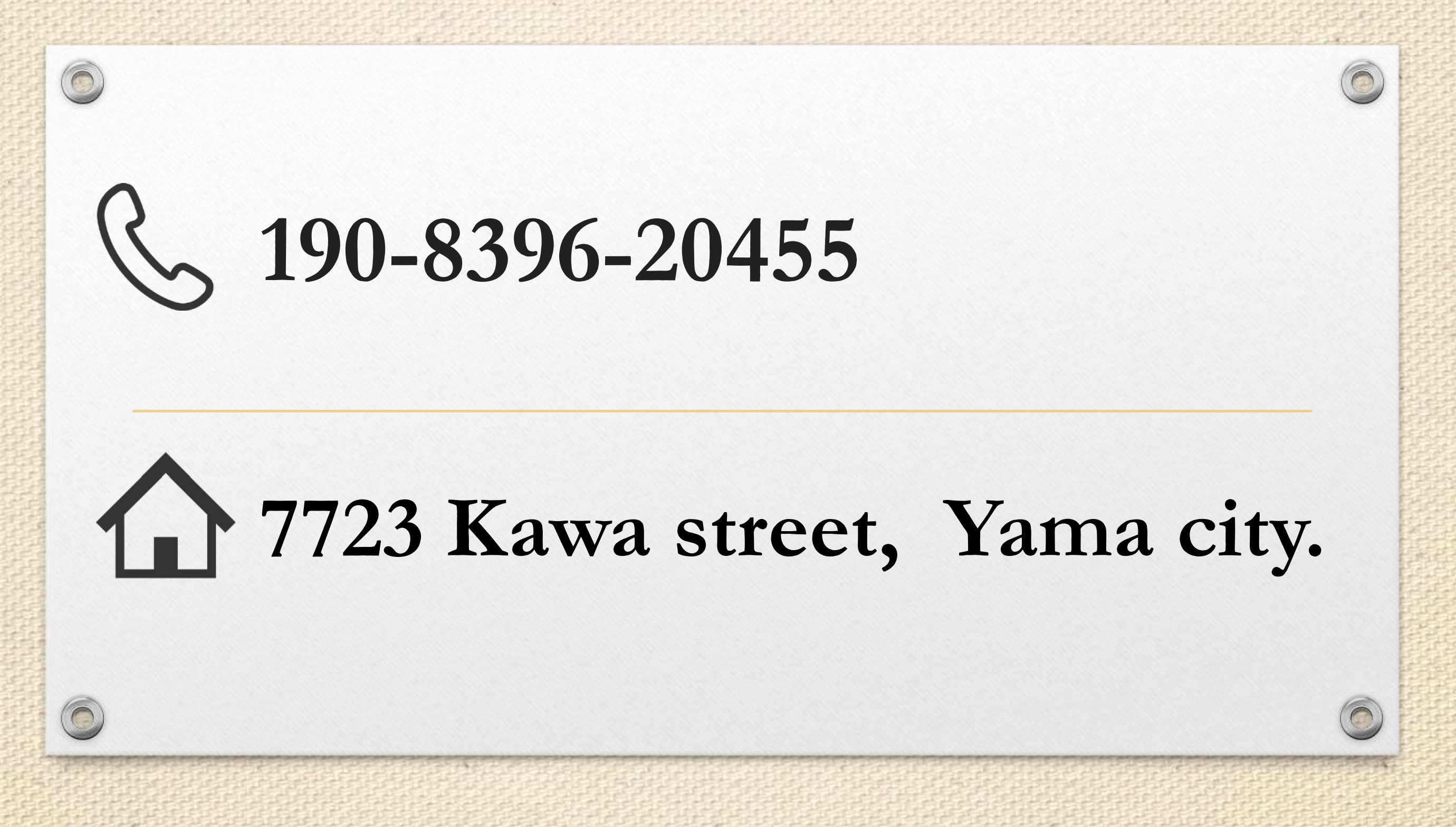
| Grammar 文法 |
Pronunciation 発音 | Vocabulary 単語 |
Comprehension 理解 |
|
|---|---|---|---|---|
 GOOD GOOD |
文法の誤りはほとんどなく、完全な文章で話すことができる | ほとんどの単語をはっきりと正しく発音することができる | 習った表現を適切に使うことができる | 文章を理解し、質問に正しく答えることができる |
 FAIR |
文法の誤りはあるが、完全な文章で話すことができる | 発音の練習が必要な言葉がいくつかある | たまにミスはあるが、習った表現を適切に使うことができる | 文章を完全に理解するのは難しく、質問に正しく答えられないときもある |
 POOR |
文章で話すのは難しく、単語だけで話すことができる | 発音の練習が必要である | 習った単語と表現を少しだけ使うことができる | 文章を理解するのは難しく、質問に答えるのは難しい |
レッスン教材の改善・拡充を図ることを目的とし、アンケートを実施しております。
以下のURLからアンケートにお答えいただき、 ご意見・ご要望をお聞かせください。
アンケートはこちら
Gender
Same-sex marriage is getting recognized around the world. The Netherlands is the first country to establish a legislation to approve same-sex marriage on April 1, 2001. On that day, four same-sex couples got married. Amsterdam, the capital city of the Netherlands, is one of the famous cities in the world that is open-minded towards sexual minorities. Because of this background, over 90% of the Netherlands’ population support them. They are active in the frontline of various fields.
| 1. Question | Which country has approved the same-sex marriage first? |
| Answer: | _______________________________________________ |
| 2. Question | What is Amsterdam famous for? |
| Answer: | _______________________________________________ |
| 3. Question | What does the majority of the Netherlands’ population support? |
| Answer: | _______________________________________________ |
| Words and Expressions | Sample Sentences |
| marriage | _______________________________________________ |
| legislation | _______________________________________________ |
| establish | _______________________________________________ |
| regardless | _______________________________________________ |
| population | _______________________________________________ |
| 1. Question | Do you think the people in your country are open to sexual minorities? |
| Answer: | _______________________________________________ |
| 2. Question | Do you think the government should help with issues concerning sexual minorities? |
| Answer: | _______________________________________________ |
| 3. Question | What can you say about the people who are open about their sexual preferences in the workplace? |
| Answer: | _______________________________________________ |
| 4. Question | Do you think it’s okay for men to wear women’s clothes in public? |
| Answer: | _______________________________________________ |
| 5. Question | How can people help sexual minorities to be accepted by the society? |
| Answer: | _______________________________________________ |
| 6. Question | Do you think it helps when famous people inform the public that they are part of the sexual minority? |
| Answer: | _______________________________________________ |
| 7. Question | Why do you think accepting sexual minorities is difficult for other cultures? |
| Answer: | _______________________________________________ |
平素より弊社サービスをご利用いただき、誠にありがとうございます。
レッスン中、音声や映像などに問題が発生した場合は、
以下をご確認いただき、改善されるかお試しください。
下記のOS毎の公式FAQもご確認ください
・Windowsカメラトラブルシューティング
・Windowsマイクトラブルシューティング
・Macカメラトラブルシューティング
・Macマイクトラブルシューティング
| ブラウザの更新ボタン | Windowsショートカット | MacOSショートカット |
 左上の更新ボタンをクリック 左上の更新ボタンをクリック
|
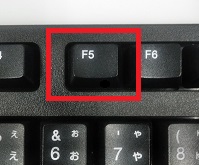 F5ボタンを押す F5ボタンを押す |
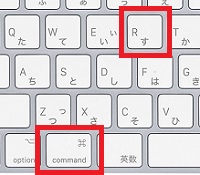 commandとRを同時に押す commandとRを同時に押す |
※一度更新したら、画面が落ち着くまでお待ちください。
または、一旦レッスンルームを閉じて、予約確認ページから入室しなおしてください。
1.ビデオ画面下にある通話操作ボタンのカメラアイコンをクリックして、ビデオをオフにする。
2.画面右上の「オーディオ設定を開く」をクリック

3.「自分の映像」欄のカメラ項目で「(disable camera)」を選択する
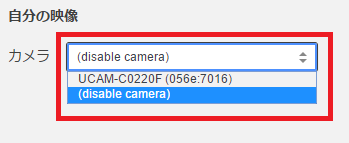
1.画面右上の「オーディオ設定を開く」クリックする

2.「相手の声」欄の「テスト音声を再生」をクリックして、テスト音声が聞こえるか確認する
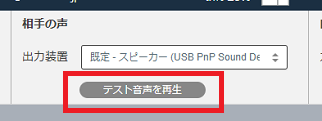
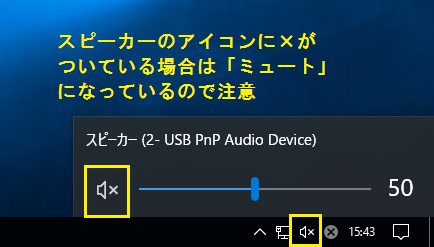
1.画面右上の「オーディオ設定を開く」をクリック

2.「相手の声」欄の「出力装置」の項目をプルダウンで変更する
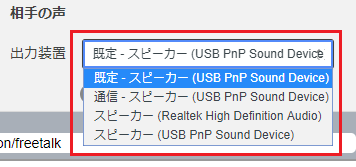
※通常は「既定」が選択されていますが、うまく音声が聞こえない場合は他に表示されている機器名を選択しなおしてください。
デバイスが正常に認識されていない可能性があります。外付けのヘッドセットやスピーカーを使用している場合は、デバイスの差し直しを行ってください。
1.画面右上の「オーディオ設定を開く」をクリック

2.「自分の声」欄の「入力装置」の項目をプルダウンで変更する
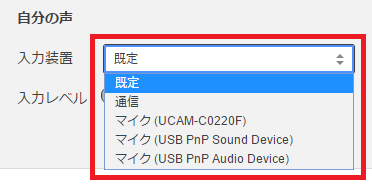
※通常は「既定」が選択されていますが、うまく音声が認識されない場合はご利用のマイクを選択しなおしてください。
Google Chromeがデバイスをブロックしている可能性があります。
Google Chromeのアドレスバーのカメラアイコンをクリックして、デバイスの接続を許可してください。
1.画面右上の「オーディオ設定を開く」をクリック

2.「自分の映像」欄のカメラ項目で「(disable camera)」を選択する
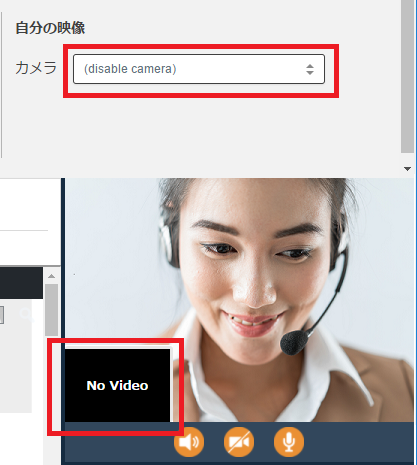
1.画面右上の「オーディオ設定を開く」をクリック

2.「自分の映像」欄の「カメラ」項目でご使用の機器名をクリック

パソコン本体にWebカメラが接続されていないか、無効の状態です。
外付けの機器の場合は、差し込みなおしてください。
内蔵の機器の場合は、デバイスマネージャーで無効になっていないかご確認ください。
Google Chromeがデバイスをブロックしている可能性があります。Google Chromeのアドレスバーのカメラアイコンをクリックして、デバイスの接続を許可してください。
セキュリティソフト等のウイルス対策プログラムによって
GoogleChromeとWebカメラのアクセスが遮断されている場合がございます。
一時的にセキュリティソフトを無効にしてWebカメラの接続が可能かご確認ください。
(確認後は、セキュリティソフトの設定を有効に戻してください。)
※セキュリティソフトの設定については、各メーカーにご確認ください。
Windows側でカメラを使用するための許可を設定する必要があります。
Windowsの設定からGoogleChromeがカメラにアクセスできるように設定してください。
詳細な手順については下記のヘルプページをご参照ください。
・Windows 10 でカメラが動作しない
https://support.microsoft.com/ja-jp/help/13753/windows-10-camera-does-not-work
・起動している不要なソフトを終了させる。
・タスクトレイに常駐しているソフトを終了させる。
・レッスン中はGoogle Chromeでマイページとレッスンルームのみ開き、他のタブは閉じる。
上記をお試しいただいても改善されない場合は、サポートまでお問い合わせください。
こちらのよくあるご質問もあわせてご参照ください。
→よくあるご質問
Weblio英会話 サポート担当
| 1. | What is your name? |
| 2. | Do you live with your grandparents? |
| 3. | Do you help with household chores? |
| 4. | Do you know how to cook? |
| 5. | What do you usually do at home? |
| My tutor’s name is | |
| Bill: | My family and I will stay at my grandparents’ house during summer vacation. |
| Alex: | That’s good. You said the place is surrounded by beautiful nature, didn’t you? |
| Bill: | Yes. My favorite thing to do is going for a walk after dinner. We see fireflies everywhere. |
| Alex: | Amazing. I’ve never seen fireflies before. |
| Bill: | My mother likes it when we stay at my grandparents’ house. It is because when we are home, I usually spend my time on my phone, playing video games or watching movies. |
| Alex: | I see. Me too, but I also have to do housework because my parents work night shift sometimes. |
| Bill: | Oh, that’s why you’re good at cooking! Actually, I’ve never cooked in my life. |
| Alex: | Seriously? I think your mother will be happy if you ask her to teach you how to cook. |
| 1. | Why does Bill’s mother like it when they stay at his grandparents’ house? |
| Answer: | |
| 2. | What is Bill’s favorite thing to do after dinner? |
| Answer: | |
| 3. | Why is Alex good at cooking? |
| Answer: |
(Note to tutor: Please find the answer key in the last page.)
| 1. | Tutor: | What do you usually do when you have free time at home? | |
| Student: | I usually paint flowers. | ||
| Tutor: | I also like to paint and post my paintings on my website. Do you want to see my work? | ||
| Student: |
| a. | I will show you. | ||
| b. | It’s mine. | ||
| c. | Sure. I will post my paintings. | ||
| d. | Definitely. What is your web address? |
| 2. | Tutor: | What kept you busy last night? |
| Student: | I helped my mother cook dinner. | |
| Tutor: | How often do you cook with her? | |
| Student: |
| a. | I don’t know. | ||
| b. | Twice a week. | ||
| c. | I’ll do it. | ||
| d. | It’s fun. |
| 3. | Tutor: | What housework do you like doing? |
| Student: | I don’t like doing housework. It is very tiring. | |
| Tutor: | It is fun. Why don’t you try doing it with your family? | |
| Student: |
| a. | I don’t think so. | ||
| b. | That’s a great idea. | ||
| c. | Yes. It is boring. | ||
| d. | No. I want to do housework. |
| 4. | Tutor: | Hi, what do you have there? |
| Student: | Cupcakes. I baked them yesterday. | |
| Tutor: | They look yummy! Who taught you how to bake? | |
| Student: |
| a. | My mother helped me bake them. | ||
| b. | I don’t like baking. | ||
| c. | My sister who is a pastry chef taught me how to do it. | ||
| d. | Do you want some? |
| 5. | Tutor: | Do you have a pet? |
| Student: | Yes, I do. My father and I usually play with my puppy at home. | |
| Tutor: | How cute! Who looks after your puppy when you’re not home? | |
| Student: |
| a. | I bring my puppy to school. | ||
| b. | I take care of my puppy when I’m not home. | ||
| c. | My mother. She is always home. | ||
| d. | I don’t like puppies. |
| Situation: | Your tutor will pretend as your friend. You will ask your tutor questions about his/her free time at home. |
||||||||||||||||||||||||||||||
| Items to mention: |
| – activities you do at home during your free time | ||
| – how often you do it | ||
| – housework you do | ||
| – favorite housework | ||
| – least favorite housework | ||
| – time you watch TV | ||
| – favorite time of the day |
| 1. | d |
| 2. | b |
| 3. | b |
| 4. | c |
| 5. | c |